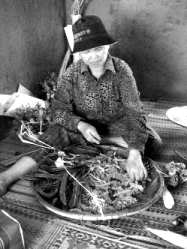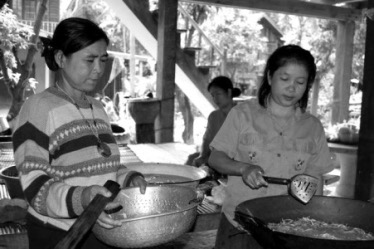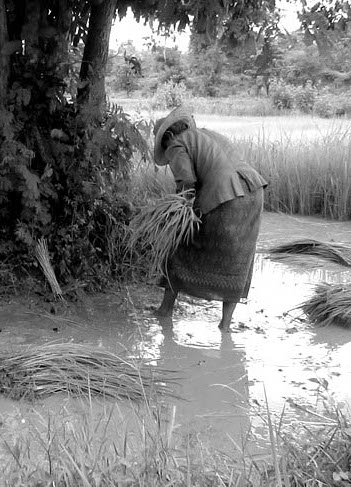
 Bound Up: Women and Alternative Agriculture
Bound Up: Women and Alternative Agriculture
Thailand has been an agricultural country, an image which is now further projected with the Thai government’s programme of making the country, “the kitchen of the world.” Indeed we are the kitchen of the world given our very diverse menus.
But the various concoctions we have produced would not have been possible had it not been for our natural resources, the preservation of our ancestors’ indigenous knowledge, and our toiling farmers. Much of our ingredients have come from agriculture, coupled with our culture, lived experiences and local wisdoms passed from one generation to another.
The Kitsch behind the Kitchen
Agriculture still absorbs majority of the population. But the past several years have seen a decline in the number of farmers. Even though Thai farmers can produce huge quantities of food, these volumes cannot truly speak of the security on food production nor the farmers themselves.
The onset of neoliberal trade has facilitated rapid changes in the agricultural sector and expanded the roles of farmers. Free trade agreements resulted in increased contract far ming system and control over the country’s agricultural production especially by multinational corporations (MNCs).
Small farmer’s reliance on their own lands has been immensely affected as they feel the pressure to become labourers in big farms and giant agro-companies. Others have also been forced to leave for bigger cities to ensure the survival of family members left in the provinces. These migrants are further challenged by the otherwise unfamiliar conditions in the cities.
The modernisation of agriculture directed by export orientation has entailed huge investments and external farm inputs such as chemical fertilisers and hybrid seeds on mono-cropping.
Far mers have also been left without sufficient government support, particularly when prices of agricultural products fluctuate in the market. They could not even benefit from basic support on the legal processes for their land claims and ownership, soil improvement, water supply development and other measures which can prepare them for droughts and floods.
Women in the Nuances of Neoliberalisation
These developments in agriculture have not only meant the marginalisation of small farmers. But there are finer differences on how the impact of neoliberalism is experienced by different people, especially between women and men.
Women, who have been playing a key role in ensuring food security in households and communities, have been made to shoulder additional work as well as risks.
While state policies and projects have made concessions with agro-businesses to enable the latter’s higher income and its consequent contribution to economic growth, communities have been left to deal with toxic pollution, rendering certain sectors such as women even more vulnerable.
Women often lack health care benefits and welfare protection. They also earn lower wages and yet they work harder and longer than men. This, on top of being the keeper and manager of resources within households and communities.
Women have been expected to gather food from the wild; cultivate the soil, including its preparation for composting; select rice and vegetable seeds; raise domesticated animals; and earn income from commercial farming. They have also played an essential role in the campaigns for the conservation and protection of community resources.
Despite bearing such risks for an immense contribution, women’s roles have not been genuinely recognised nor accounted for in development processes.
Neoliberalism has not only marred these roles, it has devalued women’s labour and reconfigured the relationships within communities. When the modern system of resource ownership comes into play, the role of women is played down. For example, the role in selecting and keeping seeds, which is an indigenous wisdom inherited from their ancestors, is replaced by seeds from agri-business corporations.
With lesser wage and without social security, women are more vulnerable in times of crisis. Women’s continuing unpaid household work is likewise devalued in a quite advanced capitalist system.
The demands of commercial cropping system have also altered the high sense of interdependence and reciprocity among members of the family and community as well as the communities’ relationship with nature. The pressure to feed the family is so real that parents spend less and less time with their children. The collective practice of harvesting and dividing yields, processing and preserving food products with the goal of stocking the pantry of every household has become a thing of the past.
 The new way of working for most farmers is characterised by heavy reliance on external factors, often miring farmers in the vicious cycle of indebtedness, lack of security in production and consumption. In this new way of working, women have lost their stake in the management of local food. Their meaningful participation in decision-making and access to various natural, economic and political resources have also been limited.
The new way of working for most farmers is characterised by heavy reliance on external factors, often miring farmers in the vicious cycle of indebtedness, lack of security in production and consumption. In this new way of working, women have lost their stake in the management of local food. Their meaningful participation in decision-making and access to various natural, economic and political resources have also been limited.
Although women have been given the opportunities to represent communities in the public sector and government projects, their roles as decision makers have not been truly supported. In fact, only certain leadership positions allow a certain number of women.
Asserting Alternatives
Given the current farm production and trading systems and their disturbing impact on communities and marginalised sectors, there is an urgency to seek and assert alternatives, especially those which have been tried and tested by past generations of farmers and which nurture both people and the natural environment.
Alternative agriculture is a farming system that reduces and avoids the use of chemicals in the process of food production, while ensuring both a balance in the ecosystem and efficient outputs essential to the livelihood of the community. Moreover, it has a strong correlation with women’s development, as much of the pressure of neoliberalism has been felt by women and the land.
One woman farmer asserted, “We grow rice and vegetable for our own consumption. If we buy food from the market, it will be expensive and not safe. In alternative farming, we can share our produce with our neighbours. We will exchange our produce with one another. It is good for us to share and exchange so that we will live like brothers and sisters without having to depend solely on market. It is happy. It is warm to live like brothers and sisters.”
The Foundation of Reclaiming Rural Agriculture and Food Sovereignty Action (RRAFA), an non-government organisation that promotes the rights of women in the agriculture, aims to (re)discover values and the significance of women’s participation so that stories, ideas and perspectives of women would truly be considered and supported.
Aside from organising women in rural communities, RRAFA also strengthens the capacity of women as leaders in their communities and agricultural development. One of the activities of RRAFA centred on the Ban Kud Taglai community located in the Naku district, Kalasin, Northeast Thailand and home of the Phu Tai indigenous peoples.
The Phu Tai people prefer to live as a group who has a strong sense of diligence, justice and courage in their work. Aside from having their own language, they also have a distinct craftship in weaving, wickerwork and rice farming, among many others.
Alternative agriculture has a strong correlation with women’s development, as much of the pressure of neoliberalism has been felt by women and the land.
The women of Baan Gud Taglai are engaged in rice cultivation as their main occupation. Once they are free from far ming, most rever t to their other occupation, weaving both silk and cotton. At almost every home, a loom can be seen with a half-woven cloth, waiting for the women to come back from the fields or other domestic chores and animal raising.
The women have likewise been making an immense contribution to the community’s access to land. Their income for their weaving has been used as part of the seed fund to legally claim and acquire their lands. During village meetings, women have also shared their ideas and recommendations on community development. But in the sub- district Administration Organisation, women are low-key, limited to the Livelihood Group.
As one woman said, “Women take part actively in community development. When there is village meeting, women take part in giving suggestions, such as installing lighting system on the street to the temple. But women are not leaders, because it is the work of men. Women will not be in the committee of the One Million Baht village fund.”
One Million Village Fund
The One Million Baht Village Fund is Thailand’s Village Revolving Fund (VRF). In 2001, former Prime Minister Thaksin Shinawatra launched the VRF with the aim of capitalising the most local units and reducing poverty. Every village had to set up a Village and Urban Community Fund Committee, along with their lending criteria. This process requires that 75 per cent of all adults in the village must be present and the election of 15 members. Half of them must be women.
The committee then opens an account at the Bank for Agriculture and Agricultural Cooperatives (BAAC), where the government deposits 1 million Baht, and evaluates loan applications from the village. With two guarantors, borrowers can apply for a loan amounting to as much as 20,000 Baht at the BAAC.
By 2005, almost all 74 rural and 4,500 urban villages had already set up their own committees, with the government releasing 78 billion Baht (US$1.75 billion).
Sources: Boonperm, Jirawan, Jonathan Haughton and Shahidur R. Khandker. (2007). “Does the Village Fund Matter in Thailand?”; and Shahid Khandker (2007). “Does the Village Fund Matter in
Even though the political roles of women are not yet fully accepted, the Phu Tai women are taking their chances at every opportunity to make their community healthier and safer. Aside from helping their community’s land acquisition, the women are promoting alternative farming.
“Our life is safe without using chemicals. At the moment, many people got sick because of chemicals. I want to teach my children to do farming without depending on chemicals,” a woman farmer shared.
Another added: “In the past, we used a lot of chemical fertilisers, about 14 to 15 sacks. Now, I use only four to five sacks and I am trying to replace it with organic fertilisers in response to the policy of the group. If I don’t use it, the yield would fall down sharply because our soil has been destroyed very much by chemical fertilisers long before.”
One also opined, “Women are more delicate. They are able to see what is nice and not, whether a grain is too long or short...We grew many varieties. Now my cousins came to visit us. They said our rice looked nice, aromatic and plentiful. We exchanged these seeds for about 20 to 30 baskets.”
Currently, the Women’s Group in Ban Gud Taglai continues to (re)discover their powerful potentials as members of the community. Although there remains several issues that need to be addressed in ensuring gender equality within the community such as men taking on some of women’s tasks and women assuming leadership roles, the women are determined to build on their strengths and assert their role in development.
Together, they always chorus, “Women united, will never be defeated.”





 The
The 
 Isis Resource Center holds one of the largest feminist collections of materials in the Global South. With 40 years of publication experience, Isis holds a vast collection.
Isis Resource Center holds one of the largest feminist collections of materials in the Global South. With 40 years of publication experience, Isis holds a vast collection.